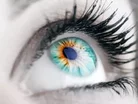Restoring Vision to the Blind: Wouldn't that Be Mice?

Written by Alyssa Clark
Restoring Vision to the Blind: Wouldn’t that Be Mice?
Believe it or not, the University College London’s scientists just may have done the impossible— a recent study has created the possibility of restoring sight to the blind. The how to’s of this new intricate development is explained in a story reported by New Scientist, as more and more people are becoming aware of this life-changing possibility.
Stemming from researchers being able to grow light-sensing cells found in the retina of the eye from scratch, these scientists have been able to successfully transplant these embryonic stem cells into the eyes of blind mice. How’s that for medical innovation?
This study targets restoring the vision of those with no remaining photoreceptor cells and although full, successful restoration hasn’t yet been reached, the researchers have successfully restored vision to a man with partial blindness. When these lab-grown photoreceptor cells are newly implanted into the mice’s eye, they can successfully establish connections with the nerves and send visual signals to the brain. The positive results that have been generated by the harmless testing that has occurred on these mice leave researchers ecstatic about the potential for this technology to be utilized in humans.
Blindness is caused by the degeneration of photoreceptor cells, and by implementing these new “home grown” cells, this technology can virtually eliminate that problem for patients with diabetes or simply matters associated with standard aging as well. The New Scientist reports that Robin Ali, the director of the team to invent and perform the transplant, has high hopes for the experiment. Leaving no one behind, Ali hopes that this surgery will “help us treat a broad range of patients”, and help give people back their sight, something they have long thought impossible.
Ali explains that they "now have a route map for doing this with human embryonic stem cells," and that "the challenge is to get [the procedure] efficient enough for transplants."
It has taken over a decade to get this testing up, running and producing quality results— but patience proves once again to be a virtue for those waiting to see their own future sight possibilities. Unfortunately, the process may take another 5 years to make it to the human testing spectrum, but with this technology on the horizon, it sure makes the dark days for those afflicted with blindness much more hopeful. Having this technology readily available and being constantly furthered can only benefit those waiting on a solution, and this reassures them that regaining sight is not just an idea, it’s an actual possibility.
The procedure has actually already produced results on a man who had a few surviving photoreceptor cells, as he managed to successfully accept the lab-grown ones, and he was able to eventually regain sight. Crossing curing partial-blindness off the list of to do’s for this study is a large feat, and is one that will have people continuously talking for years to come as they wait for the day when patients will be able to see this study’s results firsthand.
About the Author
Alyssa Clark is the Editor of Healthcare Global



